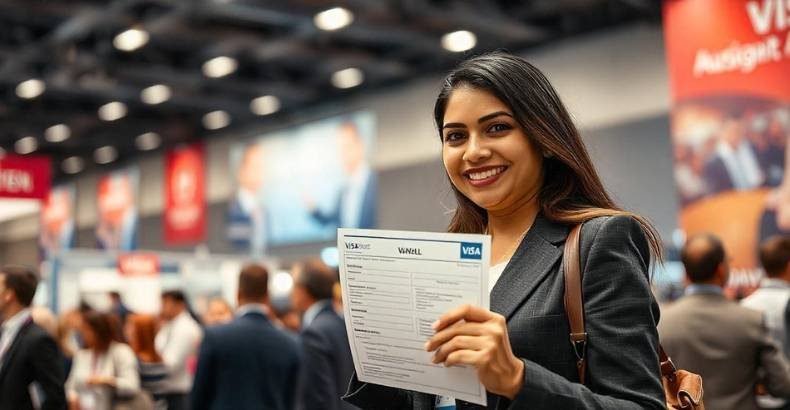There are many opportunities for networking, learning, and growth at a business conference in Canada. Those who are not Canadian citizens, however, will need a visa for this purpose. So, you must know how do you get a visa to attend a business conference in Canada to ensure a smooth travel experience.
To get a visa for your trip, you must first understand the requirements set by the Canadian government. Different types of visas are available depending on your visit purpose. By following the right steps and preparing the necessary documents, you can increase your chances of obtaining the visa you need.
We will guide you through the entire process of getting a visa for a business conference in Canada. By the end, you will have a clearer idea of how to get a visa to attend a business conference in Canada and what to expect at every stage of the process.
Visa Requirements for Canada to Attend Business Conference
To attend a business conference in Canada, obtaining the appropriate visa is essential for most international travelers. Depending on your nationality, you may require a Visitor Visa (Temporary Resident Visa) or an Electronic Travel Authorization (eTA). The application process typically includes completing an online form, providing proof of your purpose for travel, and submitting supporting documents such as your conference invitation letter, financial proof, and travel itinerary.

Knowing the visa requirements for international business conferences is essential for a smooth travel experience. Depending on the applicant’s nationality, they may need to demonstrate their intent to return home after the conference. Additional documentation, such as an invitation letter from the conference organizers or proof of professional affiliation, may also be necessary to strengthen the application.
When gathering documents, make sure you have prepared the following documents. Completing this preparation step is crucial before moving on to the actual visa application process.
- A valid passport will remain valid for the duration of your stay.
- An invitation letter or registration confirmation from the conference organizers.
- Financial statements to prove you can cover your expenses.
- Any other supporting documents as specified by the Canadian government.
How Do You Get a Visa to Attend a Business Conference in Canada?
There are several important steps to getting a visa to attend a business conference in Canada. Each step plays a crucial role in making sure your application is complete. Following these steps will help you meet the requirements set by the Canadian government. This guide will walk you through the process to ensure you are well-prepared for your conference.

Step 1: Determine the Type of Visa You Need
First, identify which type of visa is suitable for your visit. If you plan to attend a business conference, you will likely need a Temporary Resident Visa (TRV). This visa allows you to enter Canada for a short period. Make sure to check if your country requires a visa to enter Canada. You can find this information on the official Canadian government website.
Step 2: Gather Required Documents
Next, collect all the necessary documents for your visa application. You will need a valid passport, a completed visa application form, and proof of your intent to attend the conference. This may include an invitation letter from the conference organizers. You should also gather any financial documents that demonstrate your ability to support yourself during your stay.
Step 3: Complete the Application Form
After gathering your documents, complete the event application form for the international business conference in Canada. Make sure to fill out all sections accurately. Incomplete or incorrect forms can delay the process. You can find the application form online, and it is usually in PDF format. After filling it out, print and sign it before submission.
Step 4: Pay the Visa Fee
Once your application form is complete, you will need to pay the visa fee. The fee may vary depending on your nationality and the type of visa you are applying for. Payment can often be made online through the official website. Make sure to keep the receipt as you will need it for your application.
Step 5: Submit Your Application
Now, submit your completed application and all required documents to the nearest Canadian visa application center or online. If you are applying online, make sure to upload all documents in the required format. If you are submitting a paper application, ensure that everything is organized and included in one package.
Step 6: Provide Biometric Information
If required, schedule an appointment to provide your biometric information. This typically includes your fingerprints and a photo. Biometric information is crucial for processing your visa application. Make sure to follow the instructions provided by the visa application center. Arriving on time for your appointment is important to avoid delays.
Step 7: Attend the Visa Interview
After submitting your application, you may be called for a visa interview. This is not always required, but it is good to be prepared. During the interview, you will be asked questions about your trip and intentions. Answer honestly and clearly, as this helps to establish your credibility. Practice common interview questions beforehand to boost your confidence.
Step 8: Wait for Processing
After your interview, wait for your visa to be processed. The processing time can vary based on your country and the current workload at the visa office. You can check the status of your application online. Once your visa is approved, you will receive instructions on how to collect your passport. Be patient during this waiting period, as it can take some time.
Step 9: Prepare for Your Trip
Once you have your visa, you can start preparing for your trip. Make travel arrangements, including flights and accommodations. Ensure that you have all necessary documents ready to present upon arrival in Canada. This includes your visa, passport, and any conference materials. Double-check your travel plans to ensure everything is in order before you leave.
Types of Visas for Attending Business Conferences
Knowing the types of visas available is important when attending a business conference in Canada. The type of visa you need depends on your nationality and your visit. Choosing the right visa type is essential for a smooth trip. Be sure to check the requirements based on your nationality and visit purpose.
- Visitor Visa (Temporary Resident Visa): If you are from a country that needs a visa to enter Canada, the visitor visa, which is the required visa for attending business conferences in Canada, allows you to stay for a limited time while participating in the conference and related activities.
- Electronic Travel Authorization (eTA): If you are from a visa-exempt country, you will likely need an eTA. This authorization allows you to fly to Canada without needing a visa. An eTA is linked to your passport and is valid for up to five years.
- Business Visa: Some individuals may qualify for a specific business visa if they are planning to engage in business activities beyond just attending a conference. This visa is for those who may negotiate contracts or meet with clients. Ensure you have documentation to support your business activities during your stay.
- Work Permit: If you intend to work or give a presentation at the conference, you may need a work permit. This visa allows you to perform specific activities related to your job during your stay. Make sure to apply for this permit in advance to avoid any last-minute issues.
What to Expect During Your Visa Interview?
If you are called for a visa interview, preparation is key. Expect questions about your purpose for visiting Canada. You will likely be asked about the conference you plan to attend and how it will help your career. Be ready to give clear and concise answers that reflect your intentions.
You may also need to explain your ties to your home country. This can include details about your job, family, or property. The goal is to show that you have strong reasons to return after you visit Canada. This reassurance can positively impact your application.
During the interview, honesty is crucial. Any discrepancies or dishonesty can lead to visa denial. Use the interview as a chance to demonstrate your credibility and intention to follow Canadian laws. Dress professionally to make a good impression. A neat appearance can help set a positive tone for the meeting.
Tips for a Smooth Visa Application Experience
Applying for a visa can be a simple process if you follow some helpful tips. Being organized and informed can make a big difference in your experience. Here are some key tips to keep in mind for a smoother visa application journey:

- Start Your Application Early: Begin your application process well in advance. This will allow ample time for processing and any unexpected delays.
- Double-check Your Documents: Review all your documents carefully before submission. Ensure everything is accurate and complete to prevent any issues.
- Keep Copies of Your Application: Maintain copies of your application and all submitted documents. This can be helpful for future reference or if you need to follow up.
- Stay Updated on Requirements: Regularly check for any changes in visa requirements. Government policies can change, so being informed ensures you have the most current information.
- Remain Patient: Check that visa processing can take time. Be prepared for a wait and keep a positive mindset to reduce stress during the process.
Frequently Asked Questions About Business Conference Visas
We’ve answered common questions about getting a visa to attend a business conference in Canada. These questions cover important details to help you navigate the visa process. Whether you are applying for the first time or looking for specific information, this section is here to assist you.
What Types of Visas Are Needed to Attend a Business Conference in Canada?
For attending a business conference in Canada, you typically need a Temporary Resident Visa (TRV). This visa allows you to stay in Canada for a limited period. Make sure to check if your country requires a visa before applying. If you are from a visa-exempt country, you may only need an Electronic Travel Authorization (eTA).
How Long Does It Take to Get a Visa for Canada?
The time it takes to get a visa for Canada can vary based on your country and the application volume. Generally, it can take anywhere from a few weeks to a couple of months. It is advisable to apply well in advance of your conference. Always check the processing times on the official Canadian government website for the most accurate information.
What Documents Are Required for a Visa Application?
Required documents typically include a valid passport, visa application form, invitation letter to the conference, and financial proof. You may also need to provide biometric information and evidence of ties to your home country. Ensure that you have all documents ready before submitting your application. Double-check the requirements based on your specific situation to avoid issues.
Can I Work While Attending a Business Conference in Canada?
No, a visitor visa does not permit you to work while in Canada. If your purpose is solely to attend a conference, you should not engage in any employment. However, you can participate in networking and business meetings. Make sure to adhere to the rules of your visa to avoid any complications.
What Should I Do If My Visa Application Is Denied?
If your visa application is denied, you will receive a letter explaining the reasons. Take the time to review these reasons carefully. You can choose to reapply after addressing the concerns mentioned in the denial letter. Alternatively, you can appeal the decision if you believe it is unfair.
Final Words
Obtaining a visa to attend a business conference in Canada is an important step for your professional growth. It allows you to network with industry leaders, gain insights, and increase your knowledge. Taking the time to understand the process can make your experience smoother and more rewarding.
So, how do you get a visa to attend a business conference in Canada? Determine the type of visa you need based on your nationality. Gather all required documents and complete the application form accurately. Pay attention to details, as they can impact the outcome of your application.